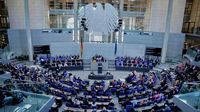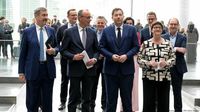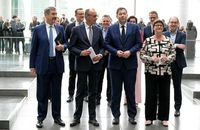Germany's political landscape is undergoing a significant transformation as the Christian Democratic Union (CDU/CSU) and the Social Democratic Party (SPD) have officially reached a coalition agreement, paving the way for a new government. This announcement was made during a joint press conference on April 9, 2025, more than six weeks after the general elections held on February 23, 2025. Friedrich Merz, the leader of the CDU, is set to become the new chancellor, succeeding Olaf Scholz.
Merz expressed optimism about the coalition, stating that it aims to create a "strong and effective government" capable of addressing pressing issues such as stricter migration policies, increased defense spending, and economic revitalization. He emphasized the need for Germany to take a leading role in Europe, especially in light of geopolitical challenges exacerbated by U.S. tariffs under the Trump administration.
This coalition marks the fifth grand coalition, or "GroKo," between the CDU/CSU and SPD since World War II, with three of these governments previously led by Angela Merkel. The coalition agreement, a comprehensive 144-page document, outlines ambitious plans for the country, including tax cuts, a tougher stance on migration, and significant infrastructure investments.
In the coalition agreement, the parties have committed to reaching a medium-term free trade deal with the United States while aiming to avoid trade conflicts and reduce import tariffs. Additionally, they plan to lower electricity prices by at least 5 cents and enhance gas power plant capacity. A notable component of the agreement is the commitment to a binding EU climate target to cut net emissions by 90% by 2040, alongside a legislative package for carbon capture and storage.
The agreement also proposes a corporate tax rate reduction starting in 2028, tax-free overtime pay, and a minimum wage target of 15 euros per hour by 2026. On defense, the coalition plans to significantly ramp up spending to meet NATO targets while introducing a new form of voluntary military service. The government will continue its support for Ukraine amidst ongoing tensions with Russia.
On the migration front, the coalition intends to suspend family reunification for individuals with subsidiary protection status and end all federal admissions programs for refugees. Asylum seekers will be rejected at land borders, and Germany will begin deporting individuals to Syria and Afghanistan, starting with those deemed criminals or potentially dangerous.
Merz stated that the new government should be formed shortly after April 28, 2025, when the CDU will hold a party conference to decide on the coalition agreement. He indicated that elections for chancellor could take place the following week, with the Bundestag expected to vote on his appointment on May 7, 2025.
The announcement of the coalition agreement coincides with a significant development in the political landscape, as the far-right Alternative für Deutschland (AfD) has topped the polls for the first time in history, garnering 25% of voting intentions, just ahead of the CDU. AfD co-leader Alice Weidel criticized the coalition, stating that citizens are seeking political change rather than a return to the status quo.
In response to questions about the coalition's approach to U.S. President Donald Trump's tariffs, Merz asserted that Germany is "back on track" and ready to strengthen its defense spending while improving its competitiveness in trade. He emphasized that the coalition would work to restore confidence and cohesion in society, aiming to modernize the state and make it more efficient.
Social Democrat co-leader Saskia Esken highlighted the challenges faced by many Germans, noting that life has become more complicated and strenuous. She called for the coalition to ensure a change of direction to address these concerns. CSU leader Markus Söder described the coalition agreement as a "Germany Pact," signaling a commitment to the people of Germany and addressing their needs.
As the coalition partners prepare for the next steps, the SPD is expected to receive seven ministries in the new government, while the CDU will have six and the CSU three. Key appointments are anticipated, with SPD's Lars Klingbeil expected to serve as Finance Minister, while the CDU's Johann Wadephul is being considered for Foreign Minister.
Despite the optimism surrounding the coalition agreement, there are concerns from various sectors. The AOK, Germany's largest health insurance provider, criticized the coalition's healthcare provisions as vague, expressing disappointment that many original proposals for relieving financial pressures on health and long-term care insurance have been abandoned.
With the coalition agreement now in place, all parties must secure the necessary approvals from their members before Merz can officially take office. This includes an online vote by SPD members, a party meeting for the CDU, and a decision by the CSU's leadership. If all goes as planned, Merz will lead a government tasked with navigating Germany through a tumultuous political and economic landscape, addressing rising populism, and ensuring the country's stability and growth in the years to come.









